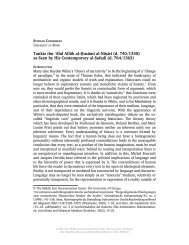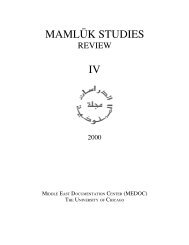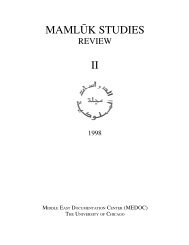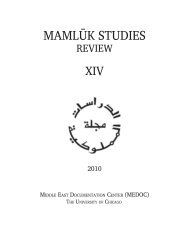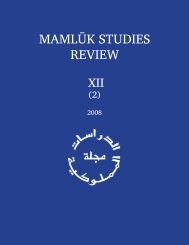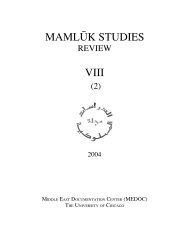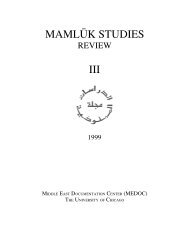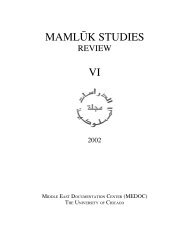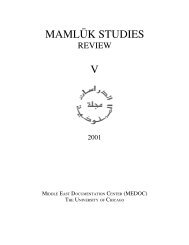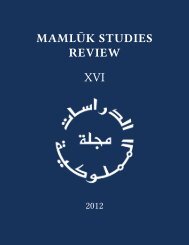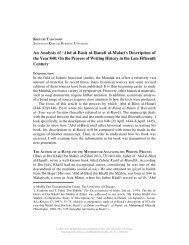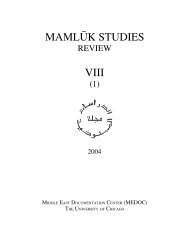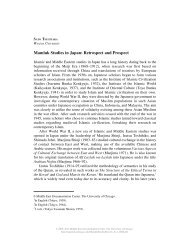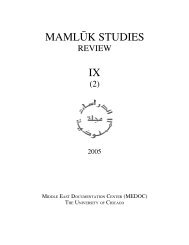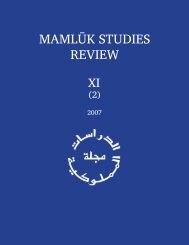Vol. VII, no. 1 (2003) - Mamluk Studies Review - University of Chicago
Vol. VII, no. 1 (2003) - Mamluk Studies Review - University of Chicago
Vol. VII, no. 1 (2003) - Mamluk Studies Review - University of Chicago
You also want an ePaper? Increase the reach of your titles
YUMPU automatically turns print PDFs into web optimized ePapers that Google loves.
MAMLU±K STUDIES REVIEW VOL. 7, <strong>2003</strong> 19<br />
in the manners, customs, and argot <strong>of</strong> the Banu≠ Sa≠sa≠n and other disreputable<br />
types. In these respects, the career and writings <strong>of</strong> Shams al-D|n Muh˝ammad Ibn<br />
Da≠niya≠l (ca. 646–709/1248–1310) are instructive. Ibn Da≠niya≠l, who came from<br />
Mosul and who made a living as an oculist, with a shop just inside Cairo's Ba≠b<br />
al-Futu≠h˝, had distinguished friends. They included the historian Ibn al-Dawa≠da≠r|,<br />
Muh˝ammad ibn Jankal| al-Ba≠ba≠ (the cultured son <strong>of</strong> a wafid| amir, who was an<br />
expert on medicine, hadith, music, and grammar), and, above all, Qala≠wu≠n's son,<br />
Khal|l (later to rule as al-Ashra≠f Khal|l). Ibn Da≠niya≠l wrote a long medical poem,<br />
several verse panegyrics on <strong>Mamluk</strong> amirs, qas˝|dahs and muwashshah˝s, and a<br />
perfectly respectable and respected verse history <strong>of</strong> the judges <strong>of</strong> Egypt. But he<br />
also produced scripts for three shadow plays that deal with characters who live in<br />
or on the edges <strong>of</strong> the social underworld. T˛ayf al-Khaya≠l (Shadow <strong>of</strong> the imagination)<br />
is about the quest for marriage <strong>of</strong> a disreputable old soldier. ‘Aj|b wa-Ghar|b<br />
presents a parade <strong>of</strong> members <strong>of</strong> the Banu≠ Sa≠sa≠n and similar folk, each <strong>of</strong> whom<br />
in turn describes their precarious and disreputable modes <strong>of</strong> making a living.<br />
Al-Mutayyam wa-al-D˝a≠’|‘ al-Yutayyim (The Love-stricken one and the lost orphan)<br />
is about a homosexual passion, pursued while watching a series <strong>of</strong> fights between<br />
beasts. The plays celebrate most <strong>of</strong> the vices <strong>of</strong> the age, and their concluding<br />
scenes <strong>of</strong> repentance are perfunctory. The plays all have a strong por<strong>no</strong>graphic<br />
content and make extensive use <strong>of</strong> low-life slang. (Ibn Da≠niya≠l also wrote several<br />
poems with a similar content, dealing with wine, hashish, and acting.) Even so,<br />
Ibn Da≠niya≠l's audience did <strong>no</strong>t necessarily consist entirely or even primarily <strong>of</strong><br />
the low-lifers who frequented taverns in the more disreputable parts <strong>of</strong> Cairo. The<br />
plays, though perfunctorily plotted, show considerable sophistication in the use <strong>of</strong><br />
language and literary allusion and it is clear that Ibn Da≠niya≠l considered himself<br />
to be writing in the tradition <strong>of</strong> the maqa≠mahs. There are several explicit references<br />
in the plays to al-H˛ar|r|'s work. Certainly Ibn Da≠niya≠l was read and cited by<br />
al-S˛afad|, Ibn H˛ajar, al-Suyu≠t¸|, and Ibn Iya≠s, among others. Al-S˛afad| was probably<br />
his greatest fan. 53<br />
Ibn Da≠niya≠l's plays were composed at the request <strong>of</strong> ‘Al| ibn Mawla≠hum<br />
al-Khaya≠l|, a presenter <strong>of</strong> shadow plays in Cairo who was possibly the brother <strong>of</strong><br />
53 Muh˝ammad Ibn Da≠niya≠l, Three Shadow Plays, ed. Paul Kahle, Derek Hopwood, and Mus˝t¸afá<br />
Badaw| (Cambridge, 1992); Haarmann, "Arabic in Speech," 109–110; Shmuel Moreh, Live Theatre<br />
and Dramatic Literature in the Medieval Arab World (Edinburgh, 1992); Everett Rowson, "Two<br />
Homoerotic Narratives from <strong>Mamluk</strong> Literature: al-Safadi's Law‘at al-shaki and Ibn Daniyal's<br />
al-Mutayyam," in Homoeroticism in Classical Arabic Literature, ed. J. W. Wright, Jr., and Everett<br />
K. Rowson (New York, 1997), 172–84; Li Guo, "Paradise Lost: Ibn Da≠niya≠l's Response to Baybars's<br />
Campaign against Vice in Cairo," Journal <strong>of</strong> the American Oriental Society 121 (2001): 219–35.<br />
See also the articles by Li Guo and Amila Buturovi in this issue <strong>of</strong> MSR.<br />
© <strong>2003</strong>, 2012 Middle East Documentation Center, The <strong>University</strong> <strong>of</strong> <strong>Chicago</strong>.<br />
http://mamluk.uchicago.edu/<strong>Mamluk</strong><strong>Studies</strong><strong>Review</strong>_<strong>VII</strong>-1_<strong>2003</strong>.pdf



